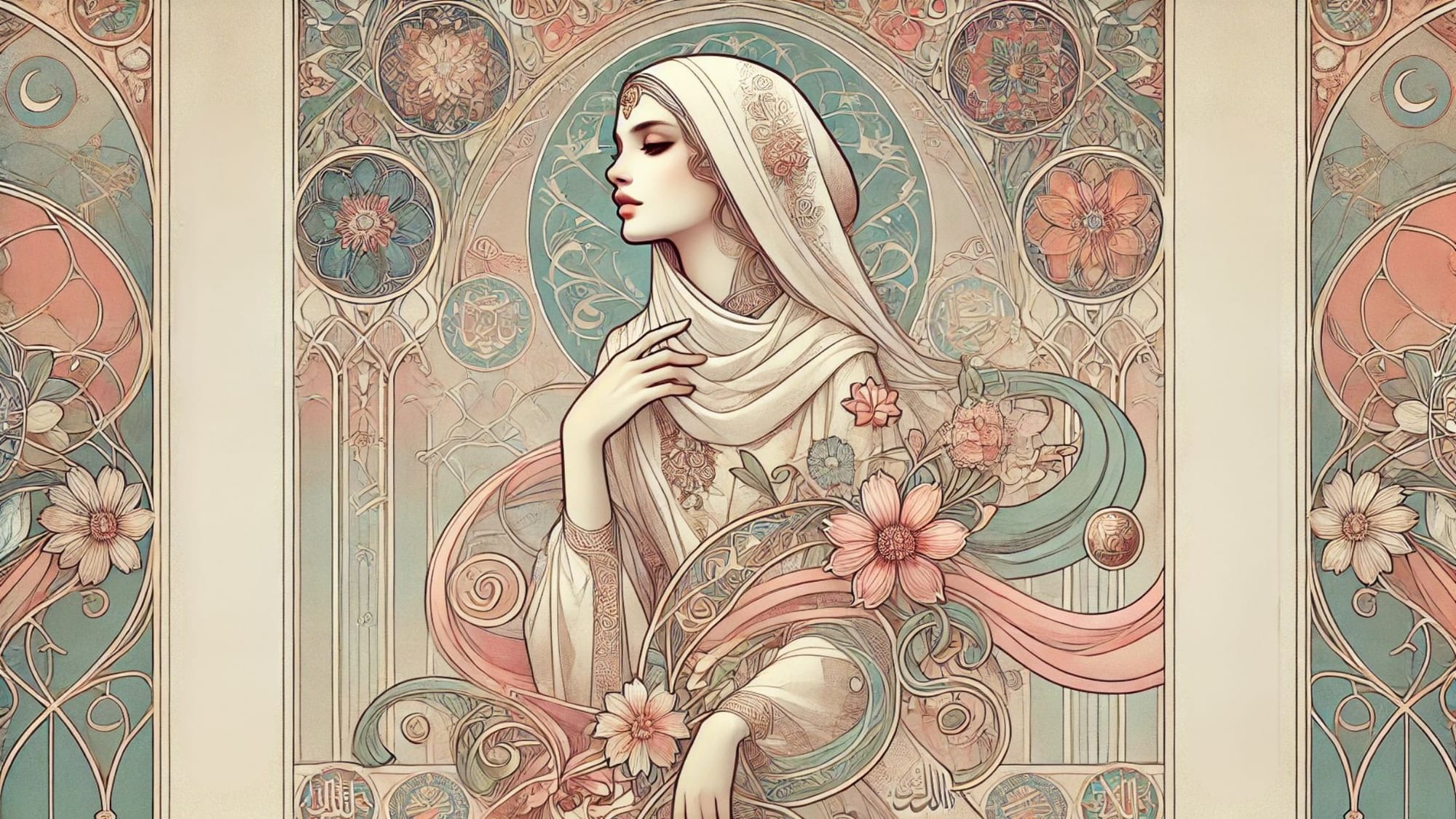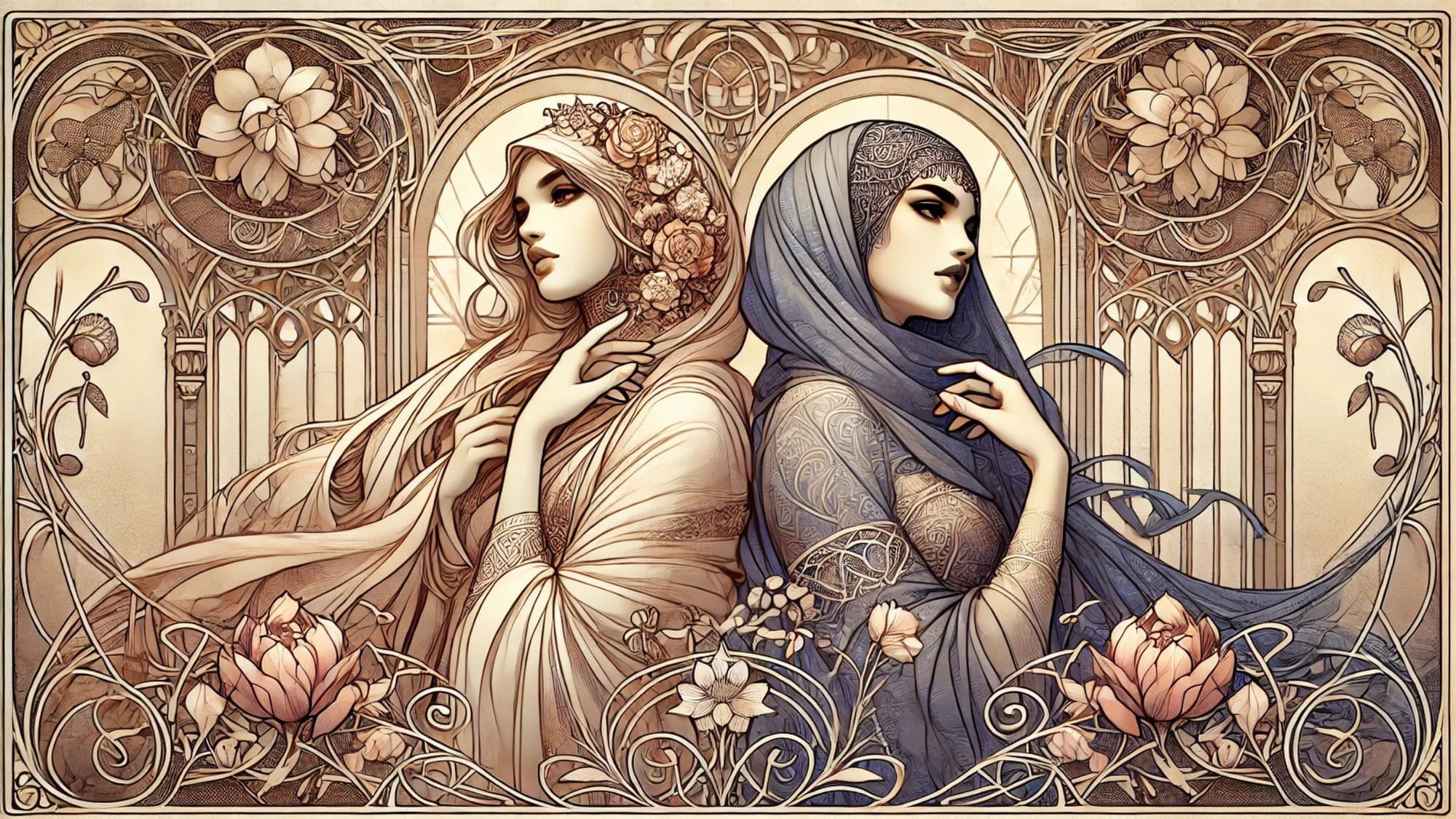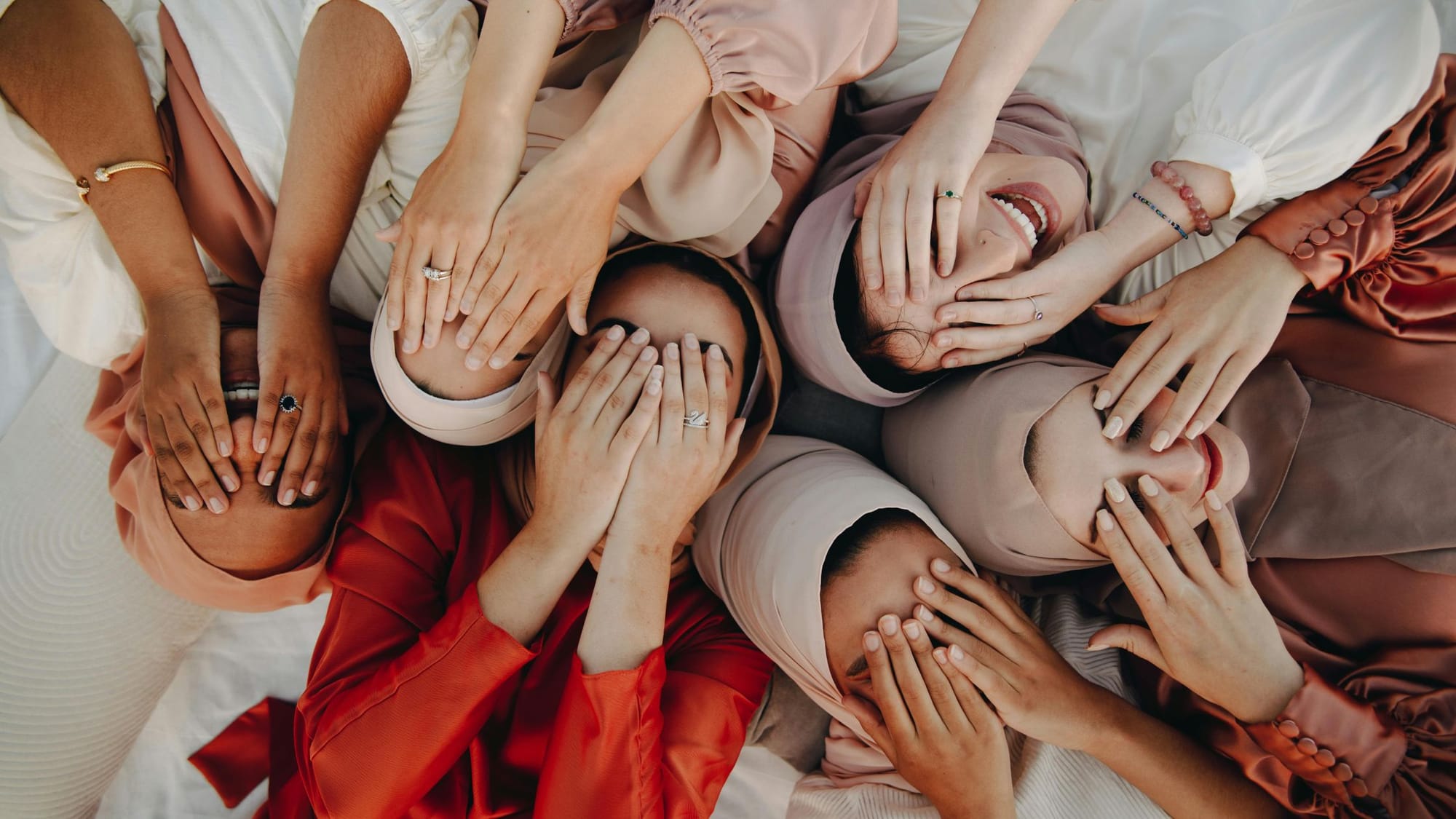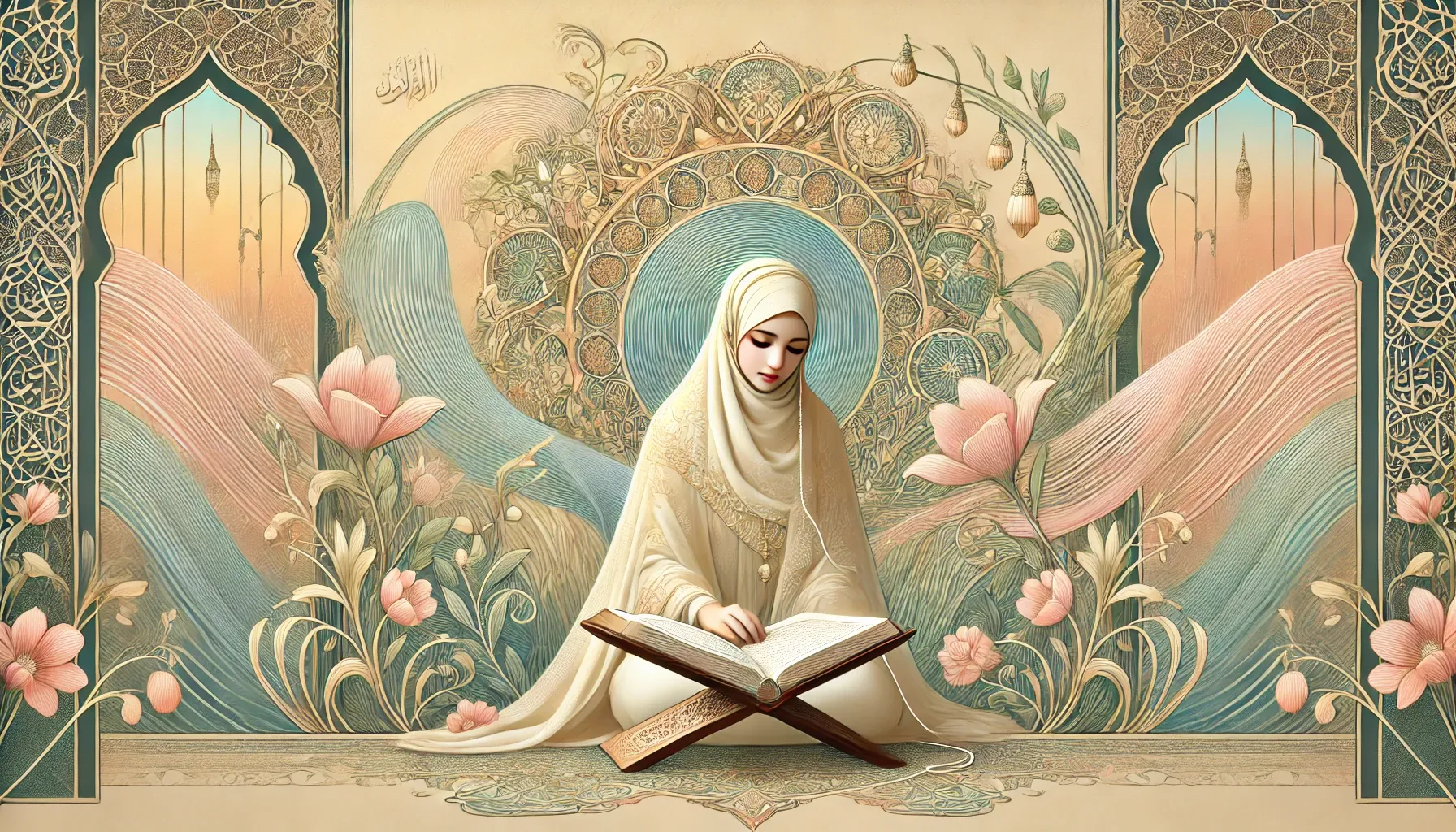5 Misconceptions About Women In Islam Debunked

Islam granted women rights to education, inheritance, and financial independence over 1,400 years ago long before many other societies.
Many people around the world have misconceptions about the role of women in Islam, often assuming that the religion itself oppresses them. However, it’s crucial to separate Islam’s true teachings from cultural and political interpretations.
Patriarchy exists worldwide, and the mistreatment of women by some Muslims is not a reflection of Islam as a religion but rather the result of cultural or personal acts.
To truly understand the role of women in Islam, we must look at the religion itself, not the actions of individuals or oppressive regimes.
In this blog post, we are going to debunk common myths about women in Islam by highlighting what Islam truly teaches based on theological sources rather than the misunderstandings shaped by cultural practices or media portrayals.
Table of Contents
- The Dominance Of Patriarchy In Western Cultures
- Islamic Teachings vs. Cultural Norms
- Common Misconceptions About Women In Islam
1. A Man Can Marry Four Women
2. In Islam, Women Must Submit To Their Husbands
3. Men Are Superior To Women In Islam
4. Muslim Women Cannot Choose Whom to Marry
5. Women Have No Rights In Islam - Conclusion
The Dominance Of Patriarchy In Western Cultures

Before anything, I want to make sure we agree that patriarchy is a dominant system and exists all over the world regardless of any religion or geographical region. Throughout history, patriarchy has been a pervasive system of social and cultural norms, with men often holding power over women.
Here, we’ll examine how patriarchy dominated in both religious contexts and secular societies, often presenting itself in similar forms regardless of religion.
Submission To The Husband
In both Christianity and Islam, the concept of a woman’s submission to her husband is central to their teachings, even though this is not necessarily a religious mandate but a cultural practice that has evolved over time.
- Christianity: Christian teachings, particularly from the Bible, emphasize a woman's duty to "submit" to her husband, often interpreted as a form of female subjugation.
Many women, even today, believe they must submit to their husbands to uphold family harmony, a belief that still persists in many Christian households. - Islam: In Islamic tradition, the notion of submission is similarly expressed. Women are often taught to respect and obey their husbands, and this concept is rooted in cultural interpretations, not the core religious text itself.
The Quran’s teachings about men and women being "protectors" of one another have been historically distorted to justify male dominance.
Marriage and Choice
One key similarity is the lack of agency in women’s marital choices across both Christian and Islamic contexts.
- Christian Societies: Even within the more "democratic" Western societies, it wasn’t until recently that women gained the full right to choose their partners.
Historically, marriages were arranged for strategic or economic purposes rather than personal choice. - Islamic Societies: While the Quran acknowledges a woman’s right to refuse a marriage, it was common in many Islamic societies for marriages to be arranged by families, limiting a woman's personal choice.
This practice, similar to Western societies of the past, reflects patriarchal control over women’s autonomy.
Patriarchy In Secular European Societies
- Switzerland: Swiss women in Appenzell Innerrhoden canton had no right to vote until the 1990s.
This example highlights that patriarchal norms were not just a feature of religious cultures but were also embedded in Western societies despite their claims to be progressive and democratic. - Property Rights: In contrast to Islam, in many European nations, women did not have the right to own property until the late 19th century.
These delays in women's rights demonstrate how deeply rooted patriarchal systems were, even in modern democracies.
Islamic Teachings vs. Cultural Norms

Many of the restrictions and injustices faced by women in some Muslim-majority countries come not from Islam itself, but from cultural traditions that have been wrongly associated with the religion.
Islam, as a religion, grants women rights to education, work, financial independence, and equal spiritual status. However, in some countries like Afghanistan and Iran, cultural and political forces often override Islamic principles, enforcing rules that have no theological basis.
Here are the most common misconceptions that are actually rooted in culture and not Islam as a religion:
Female Genital Mutilation – Cultural, Not Religious
Many people mistakenly associate Female Genital Mutilation (FGM) with Islam, but this practice predates the religion and is not mandated in Islamic teachings.
In fact, FGM is carried out in various religious and non-religious communities, making it a cultural rather than a religious issue. Islam upholds bodily integrity and prohibits harm, making FGM incompatible with its principles.
Restrictions on Women's Education – Cultural, Not Religious
Another common misconception is that Islam restricts women’s access to education. However, Islamic teachings strongly emphasize the pursuit of knowledge for both men and women.
The Prophet Muhammad himself encouraged education with his famous quote, “Seeking knowledge is an obligation upon every Muslim.”
In contrast, restrictions on women’s education in some regions are driven by cultural, political, or economic factors rather than religious doctrine.
The Burqa – Cultural, Not Religious
The burqa is often viewed as a symbol of oppression, but its origins are more cultural than religious. Islam encourages modesty in dress for both men and women, but the specific interpretation varies across cultures.
Some Muslim women choose to wear the burqa, niqab, or hijab as an expression of faith, while others follow different styles of modest dress.
Over time, these cultural practices have distorted the true message of Islam, making it crucial to differentiate between religion and societal customs when discussing women's rights in Islam.
Read Also:

Common Misconceptions About Women In Islam

1. A Man Can Marry Four Women
One of the most misunderstood aspects of Islam is polygamy. Many believe that Islam encourages men to marry multiple wives freely, but in reality, it is a restricted allowance, not a requirement or recommendation.
In the pre-Islam era, men could marry an unlimited number of women. Islam set a strict limit of up to four wives, but only under specific conditions.
Islam permits polygamy mainly in cases where there is a need to protect widows and orphans (An-Nisa 4:3), such as after a big war when the male population is significantly reduced.
However, this permission comes with a major condition: a man must treat all his wives equally in all aspects—emotionally, financially, and materially. If he cannot do so, the Quran explicitly advises monogamy (An-Nisa, 129), making it the preferred option.
"You will never be able to maintain (emotional) justice between your wives, no matter how keen you are. So do not totally incline towards one leaving the other in suspense. And if you do what is right and are mindful of Allah, surely Allah is All-Forgiving, Most Merciful."
(Surah An-Nisa, 129)
Additionally, a man CAN NOT marry multiple women without the CONSENT of the women involved.
Also, Prophet Muhammad (pbuh) himself advised monogamy, as seen in his recommendation that men should only take multiple wives if they can fulfill the heavy responsibility of absolute fairness, which is something he acknowledged as extremely difficult.
Furthermore, the Prophet himself remained monogamous to his first wife, Khadija, for 25 years, demonstrating that monogamy is the ideal practice in Islam.
2. In Islam, Women Must Submit To Their Husbands

A common misconception about Islam is that a wife must blindly obey her husband in all matters, but this is a misrepresentation of Islamic teachings.
In Islam, marriage is a partnership built on mutual respect, love, and compassion, as emphasized in the Quran:
"And among His signs is that He created for you from yourselves mates that you may find tranquility in them, and He placed between you affection and mercy. Indeed, in that are signs for people who reflect."
(Ar-Rum, 21)
Islam DOES NOT command a woman to obey her husband unconditionally. A husband is not a woman’s master, nor is he above divine guidance.
If a husband asks his wife to do something that contradicts Islamic principles, she has no obligation to obey. The Prophet Muhammad (peace be upon him) made this clear when he said:
"There is no obedience to the creation in disobedience to the Creator."
(Hadith, Musnad Ahmad)
Obedience in marriage, therefore, is not about blind submission but about cooperation and trust, provided that the husband is a good Muslim who follows Islamic values.
If a man is righteous, fair, and treats his wife well, trust and harmony will naturally follow. The Prophet himself set the best example by treating his wives with kindness, consulting them on important matters, and even assisting in household chores. Aisha (may Allah be pleased with her) described him as a husband by saying:
"The Prophet would be in the service of his family. But when the time for prayer came, he would leave for prayer."
(Hadith, Bukhari)
This shows that a wife’s role in Islam is not one of subjugation but of mutual support. Both husband and wife have rights and responsibilities, and they are considered spiritual equals before Allah:
"The believers, both men and women, are guardians of one another. They encourage good and forbid evil, establish prayer and pay alms-tax, and obey Allah and His Messenger. It is they who will be shown Allah’s mercy. Surely Allah is Almighty, All-Wise."
(At-Tawbah, 71)
This verse highlights that men and women work together as partners in righteousness, not in a hierarchy where one dominates the other.
Unfortunately, patriarchal interpretations have distorted this message, making it seem as though women must obey their husbands in all circumstances, even when it goes against Islam.
In reality, Islam grants women dignity, independence, and the right to make their own moral choices.
3. Men Are Superior To Women In Islam

One of the biggest misconceptions about Islam is the belief that men are inherently superior to women.
However, the Quran and Hadith emphasize the spiritual and moral equality of men and women while recognizing their complementary roles in society.
Islam clearly states that righteousness is the only measure of superiority, not gender:
"O humanity! Indeed, We created you from a male and a female, and made you into peoples and tribes so that you may get to know one another. Surely the most noble of you in the sight of Allah is the most righteous among you. Allah is truly All-Knowing, All-Aware."
(Al-Hujurat, 13)
This Quran verse highlights that men and women are judged by their deeds, not by their gender. Islam grants both men and women equal opportunities to attain spiritual success.
There is another commonly misinterpreted verse in the Quran:
"Men are the protectors and maintainers (qawwamun) of women because Allah has given one more (strength) than the other and because they support them from their wealth."
(An-Nisa, 34)
Some take this verse to mean that men are superior to women. However, qawwamun refers to responsibility, not superiority.
This verse simply states that men have been given the duty to provide financial and physical protection for women, ensuring their well-being. So, it does not suggest that men are better than women or have unlimited authority over them.
"Women have rights over men, just as men have rights over women."
(Al-Baqarah, 228)
"The best of you are those who are best to their wives."
(Hadith, Tirmidhi)
If men were superior, why would the Prophet define excellence based on how a man treats his wife? This proves that Islam encourages mutual respect and fairness in relationships.
4. Muslim Women Cannot Choose Whom To Marry
A common myth is that Muslim women have no say in choosing their spouse and are forced into marriage. However, Islam places great emphasis on mutual consent in marriage.
The Quran also upholds a woman’s right to choose her husband:
"Do not prevent them from remarrying their [former] husbands if they agree among themselves on an acceptable basis."
(Al-Baqarah, 232)
This verse directly addresses guardians who may try to force their will on women, stating that women have the right to make their own marital decisions.
Islamic history has an excellent example of a woman choosing her husband. Khadija, the first wife of Prophet Muhammad, was a wealthy and respected businesswoman who proposed marriage to him herself.
This shows that women in Islam have the right to express their interest in marriage.
By comparison, many Western legal systems only granted women divorce rights relatively recently. In the United States, divorce laws were strict until the late 20th century, with no-fault divorce becoming widely accepted in the 1970s.
5. Women Have No Rights In Islam

One of the biggest myths about Islam is that Muslim women have no rights. In reality, Islam granted women many rights over 1,400 years ago—long before many other societies did.
5.1. Women's Right To Get Education
The Quran explicitly acknowledges women's rights in areas such as education, inheritance, work, and personal autonomy.
The first command in Islam is "Read" (Al-Alaq, 1), highlighting the importance of knowledge for all believers regardless of their gender. The Prophet Muhammad (peace be upon him) further emphasized this by stating:
"Seeking knowledge is an obligation upon every Muslim (male and female)."
(Hadith, Ibn Majah)
Islam encourages women to pursue education, and historically, many Muslim women, such as Aisha (the Prophet’s wife), were scholars and teachers of religious knowledge.
In contrast, women were largely excluded from formal schooling in medieval Europe, and it was not until the 19th and 20th centuries that higher education became accessible to them.
For example, Harvard University only allowed female students in 1945, while Oxford University granted women full degrees in 1920.
5.2. Women's Right For Financial Independence
Islam grants women financial independence. They can own, inherit, and manage their own wealth without any obligation to share it. The Quran states:
"For men is a share of what they have earned, and for women is a share of what they have earned."
(An-Nisa, 32)
Unlike in many pre-modern societies where women had no right to own property, Islam ensured that women could work, trade, and keep their earnings.
Islam DOES NOT prohibit women from working. Women, including the Prophet’s first wife, Khadija, were successful businesswomen. The Quran states:
"Whether male or female, whoever does righteous deeds while being a believer, We will surely grant them a good life (in this world). And We will certainly reward them in the Hereafter according to the best of what they used to do."
(An-Nahl, 97)
This verse affirms that both men and women have equal opportunities for success and fulfillment in life.
5.3. Women's Right To Inherit Property
Before Islam, women were often denied inheritance. The Quran changed this by giving women a rightful share:
"To the men belongs a share of what their parents and close relatives leave, and to the women a share of what their parents and close relatives leave—be it little or much. These are obligatory shares."
(An-Nisa, 7)
The claim that Muslim women have no rights is completely false. Islam grants women numerous rights—many of which were groundbreaking for their time.
Today, any oppression faced by women in some Muslim-majority cultures is due to cultural practices, not Islamic teachings.
For example, In England, the Married Women’s Property Act (1870) was the first significant law allowing married women to retain earnings and property. Before this, a woman's property automatically became her husband’s upon marriage.
Read Also:

Conclusion
Islam does not oppress women, but patriarchal cultures do - like anywhere else in the world.
We can see that Islam upholds women’s dignity, rights, and independence by differentiating between religion and cultural practices. While some societies may misuse religion to justify mistreatment or inequality, these actions often reflect cultural interpretations, not the core values of Islam.
The Quran and the teachings of Prophet Muhammad (pbuh) consistently promote respect, kindness, and equality for women, emphasizing their rights, dignity, and spiritual equality with men.


